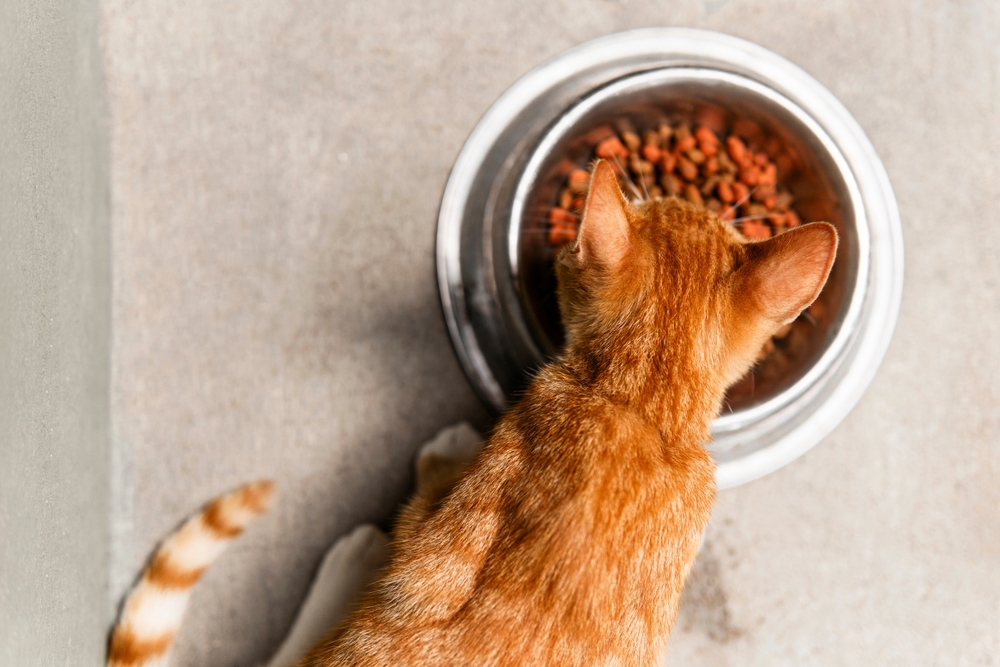From Stable to Scary: ER Crises in Pets With Chronic Illness
Stability with a chronic condition can feel like success, until it isn’t. Medications go into the organizer, the prescription diet arrives on schedule, and life feels steady. Then work gets busy. A few doses are late. Bloodwork slips because your pet looks fine. Diseases gradually worsen with time, but rechecking X-rays can feel optional when symptoms change so slowly you barely notice. Then one night, subtle becomes obvious, and what needed a small dose adjustment now needs the emergency room.
Omega Veterinary Group is here when chronic illnesses become acute crises. Our 24/7 emergency care, advanced imaging, and ICU-level therapies are available on site.
Common Chronic Conditions That Can Land Your Pet in the ER
Diabetes
A long-term problem with insulin production or response is managed with scheduled insulin, measured meals, and glucose checks. Emergencies develop with missed doses, infections, diet changes, or steroid exposure.
Emergency symptoms: vomiting, excessive thirst and urination, rapid breathing, ketoacidosis with acetone-like breath, wobbliness, collapse, seizures.
Feline Hyperthyroidism
Excess thyroid hormone accelerates heart rate and blood pressure; treatment includes anti-thyroid medication, iodine-restricted nutrition, or radioiodine combined with regular monitoring. Emergencies arise when hypertension or arrhythmias escalate or dosing becomes inconsistent.
Emergency symptoms: sudden blindness, panting or open-mouth breathing, restlessness, rapid or irregular heartbeat.
Canine Hypothyroidism
Low thyroid hormone slows metabolism and affects skin, nerves, and the heart; daily levothyroxine with timed rechecks keeps canine hypothyroidism controlled as needs change. Emergencies like myxedema are uncommon but can follow prolonged underdosing or intercurrent illness.
Emergency symptoms: profound lethargy, low body temperature, slow heart rate, mental dullness.
Addison’s Disease
Adrenal hormone deficiency disrupts electrolytes and blood pressure; mineralocorticoid therapy, baseline steroids, and stress-dose plans reduce the risk of an Addisonian crisis. Missed injections, vomiting that prevents pills, or stress without extra steroids can tip stable patients.
Emergency symptoms: collapse, vomiting, diarrhea, severe weakness, slow heart rate.
Cushing’s Disease
Excess adrenal hormones raise blood pressure, thin tissues, and predispose to infection; careful medication with periodic labs keeps Cushing’s Disease in check as target doses evolve. Emergencies stem from poor control, overmedication, pancreatitis, or clots.
Emergency symptoms: sudden weakness, abdominal pain, difficult breathing, collapse.
Chronic Kidney Disease (cats)
Progressive loss of kidney function benefits from renal diets, hydration strategies, blood pressure checks, anti-nausea support, and stage-based monitoring. Skipped checks or dehydration can trigger uremic crises.
Emergency symptoms: persistent vomiting, marked lethargy, oral ulcers or drooling, ammonia-like breath, little or no urine.
FLUTD and Feline Idiopathic Cystitis
Lower urinary tract inflammation and stones respond to hydration, diet, litterbox optimization, and stress reduction. Emergencies occur when swelling, mucous, or crystals obstruct the urethra causing a blockage.
Emergency symptoms: repeated straining with little or no urine, frequent trips to the box, vocalizing, painful or firm abdomen.
Heart Disease
Valve disease and cardiomyopathy require medication adherence, low-sodium nutrition, and daily breathing counts; tracking heart disease symptoms helps families act before fluid builds around the lungs and becomes heart failure. Missed doses, fluid accumulation, or heart rhythm changes can escalate quickly.
Emergency symptoms: rapid or labored breathing, persistent cough, collapse or fainting, pale or blue gums.
Feline Asthma
Inflammatory airway disease is managed with inhaled steroids, bronchodilators, and trigger control; consistent technique and routine reviews keep Feline Asthma from flaring. Skipped inhalers or heavy triggers can cause dangerous bronchoconstriction.
Emergency symptoms: Respiratory distress, open-mouth breathing, pronounced belly effort, rapid respirations, anxiety.
Brachycephalic Obstructive Airway Syndrome
Short-nosed breeds have narrowed airways; weight control, harnesses, heat avoidance, and early surgical consults reduce crises in Brachycephalic Obstructive Airway Syndrome (BOAS). Heat, excitement, or minor swelling can precipitate obstruction.
Emergency symptoms: extra noisy breathing, gagging, blue or purple tongue or gums, collapse during activity or heat.
Pancreatitis
Pancreatic inflammation improves with low-fat diets, anti-nausea medications, and pain control; consistent routines help prevent severe flares of pancreatitis in pets. Rich foods or medication shifts can ignite acute episodes.
Emergency symptoms: repeated vomiting, hunched posture, abdominal pain, profound lethargy.
Epilepsy
Recurrent seizures need strict dosing schedules, periodic level checks, and a home rescue plan. Missed or low dosages or exposure to triggers like excitement or stress drive clusters.
Emergency symptoms: any seizure over three minutes, three or more seizures in a day, failure to recover between seizures.
IMHA and IMTP
In immune-mediated hemolytic anemia the body destroys red cells, and in immune-mediated thrombocytopenia it destroys platelets; careful immunosuppression and frequent labs for bleeding vigilance is critical. Relapses can unfold quickly during dose changes or illness.
Emergency symptoms: pale gums or sudden weakness (IMHA); bruises, nosebleeds, dark tarry stools, or neurologic signs (IMTP).
Cancer
Many tumors are manageable with surgery, chemotherapy, or radiation alongside symptom control; staying alert to complications of cancer in pets helps you act early. Emergencies include tumor bleeding, pain crises, and infections during low white cell counts.
Emergency symptoms: sudden swelling, collapse, uncontrolled pain, pallor, fever, relentless vomiting.
Glaucoma
High eye pressure threatens vision, and consistent drops with frequent checks help preserve sight; prompt action on signs prevents pain and irreversible damage. Pressure spikes can happen even with good routines.
Emergency symptoms: sudden eye pain, redness, enlarged or cloudy eye, bumping into objects.
Dry Eye (KCS)
Poor tear production exposes the cornea to injury; tear stimulants or replacements and lid hygiene keep Dry Eye (Keratoconjunctivitis Sicca) from progressing. Stopping drops invites ulcers and deep infections.
Emergency symptoms: squinting, thick discharge, blue or cloudy cornea, reluctance to open the eye.
FIV and FeLV
Both viruses weaken immunity and blood cell production; indoor lifestyles, parasite prevention, and fast treatment of minor issues support cats living with Feline Immunodeficiency Virus (FIV) and feline leukemia virus (FeLV). Small infections can escalate fast.
Emergency symptoms: high fever, labored breathing, pale gums, profound lethargy, mouth pain with drooling.
Dental Disease
Periodontal infection damages bone and soft tissue, and pairing home care with professional cleanings prevent deep infections. Advanced disease risks jaw fractures in small breeds, retrobulbar abscesses, and tooth loss.
Emergency symptoms: facial swelling, difficulty opening the mouth, sudden tooth displacement, eye pain or bulging.
Allergies
Environmental or food triggers drive itch and infection, and consistent therapy plus ear care keeps severe flares in check; practical routines for allergies reduce hot spots and resistant ear disease. Uncontrolled scratching can snowball into large, painful lesions.
Emergency symptoms: incessant itching, rapidly spreading moist skin lesions, ear swelling with severe pain, difficulty breathing, and anaphylaxis
Why Omega Veterinary Group Is The Right Place When Stability Slips
When chronic conditions destabilize, timely assessment and decisive care prevent complications. Omega’s 24/7 emergency team coordinates with internal medicine, surgery, neurology, ophthalmology, and advanced anesthesia to address the full picture. The hospital’s critical care resources include dedicated ICUs for dogs and cats, oxygen therapy, mechanical ventilation, blood and plasma transfusions, advanced imaging such as CT and ultrasound, dialysis, interventional endoscopy, and comprehensive pain management.
Just as important, Omega partners closely with referring veterinarians so care is seamless; we stabilize and treat in the hospital, then share records, imaging, and recommendations so your primary vet can guide ongoing management. If you notice worrisome changes, contact Omega Veterinary Group for immediate guidance.
Your Chronic-Care Checklist to Stay Out of the ER
- Meds on time, every time: Use alarms and a pill box, keep a one-week refill buffer, and call for guidance if a dose is missed.
- Rechecks are non-negotiable: Chronic diseases evolve over time, and some pets require steadily increasing medication doses to stay controlled. Even when you are dosing on time, every time, the original dose can lose effectiveness. Rechecks are how we catch those shifts before they turn into emergencies.
- Home monitoring: Track appetite, water intake, energy, breathing rate at rest (for heart and lung patients), weekly weight, stool and urine output, gum color, and eye comfort.
- Nutrition and hydration: Keep diets consistent; support fluids for kidney or urinary disease; avoid high-fat treats and people food.
- Trigger control: Reduce stress, heat, smoke, allergens, and rough play if your pet’s diagnosis makes these risky.
- Written flare plan: Know which changes warrant a same-day call versus an immediate ER visit, and keep your hospital’s number visible. If numbers drift or signs escalate, contact Omega Veterinary Group for next steps.

Call or Come In Now If You Are Concerned
Omega Veterinary Group
251 N. Amphlett Blvd, San Mateo, CA 94401
Open: 24/7 for emergencies and advanced care
Phone: 650-781-4239
If your pet has a chronic condition and something feels off, do not wait. The fastest path back to stability is a prompt exam, updated diagnostics, and a targeted plan from a specialty team that treats emergencies every day. For questions, same-day concerns, or urgent arrivals, contact Omega Veterinary Group or come directly to the hospital.






Leave A Comment